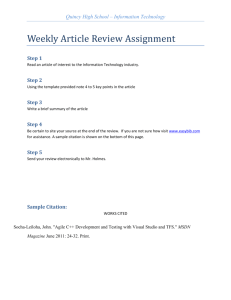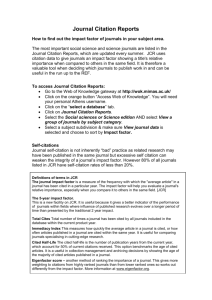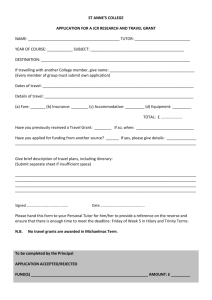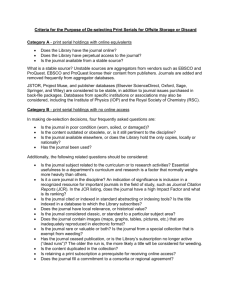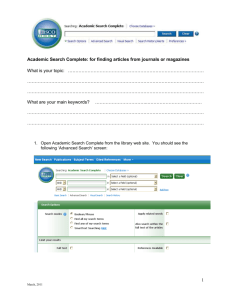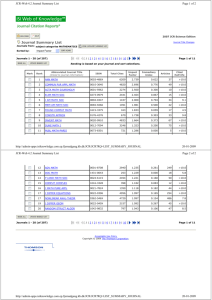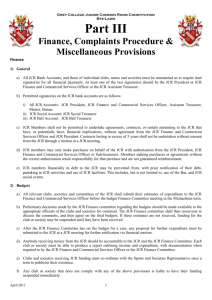guide to access jcr journal quartile
advertisement
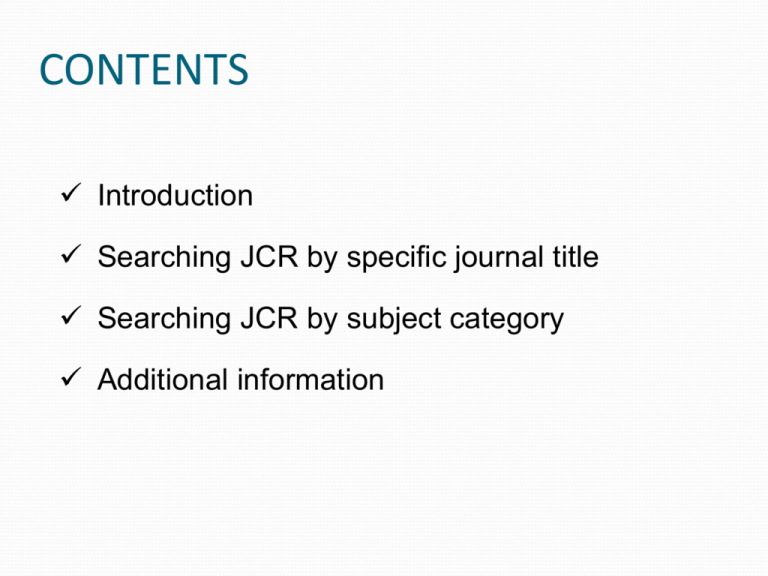
CONTENTS Introduction Searching JCR by specific journal title Searching JCR by subject category Additional information A. INTRODUCTION GUIDE TO CHECK IMPACT FACTOR AND JOURNAL RANKING USING JOURNAL CITATION REPORTS (JCR) There are 3 Citation Databases in Web of Science that index journal publications: Science Citation Index Expanded (SCI-EXPANDED) Social Sciences Citation Index (SSCI) Arts & Humanities Citation Index (A&HCI) For journals indexed in SCI-EXPANDED and SSCI, please check Impact Factor and Journal Ranking using Journal Citation Reports (JCR), a database subscribed by UM NOTE: Journals indexed in A&HCI ONLY are WITHOUT Impact Factor 1. Access Library Website : http://www.umlib.um.edu.my 2. Login interaktif Library Portal: with your member/staff card number, start with X …….. 3. Click Databases 4. Scroll down the list and choose Journal Citation Reports (JCR) 5. Click Journal Citation Reports (JCR) 1. http: //www.umlib.um.edu.my 2. Input X…….. number in your member/staff card here 3. Click on Databases xxxxxxxx 4 & 5. Scroll down the list to Journal Citation Reports (JCR) (arranged in alphabetically order) B. SEARCHING JCR BY SPECIFIC JOURNAL TITLE JCR Database: (Journals with Impact Factor are listed) Start searching … … OPTION A. SEARCH FOR A SPECIFIC JOURNAL 1. Select the correct JCR edition and year (only 2006, 2007, 2008, 2009, 2010 & 2011 are available in our database) 2. Select an option: If you know the exact name of the journal, choose “Search for a specific journal” 3. Click on “SUBMIT” button Example : Choose 2011 JCR Science Edition (Pls select the latest year in your own search) 1) Search by Full Journal Title / Abbr. Journal Title / Title Word / ISSN 2) Type search term: BRAIN AND LANGUAGE 3) Click on the “SEARCH” button and the searching process begins Note: Inconsistency in indexing “and” in title of the journal Search Result Displayed: Impact factor of this journal: 3.115 4) Click “Journal Ranking” for details of ranking of the journal in categories Details of Journal for “Rank in Category” Displayed The journal “Brain and Language” ranked: i. ii. Quartile 1 (Q1) in AUDIOLOGY & SPEECHLANGUAGE PATHOLOGY category Quartile 2 (Q2) in NEUROSCIENCES category 5) Click ‘Return to Journal’, & scroll down the screen for further information. Journal Impact Factor The journal Impact Factor is the average number of times articles from the journal published in the past two years have been cited in the JCR year. Journal Self-cites: C. SEARCHING JCR BY SUBJECT CATEGORY OPTION B. SEARCH ACCORDING TO SUBJECT CATEGORY 1. Select the correct JCR edition and year (only 2006, 2007, 2008, 2009, 2010 & 2011 are available in our database) 3. Click on “SUBMIT” button 2. Select an option: If you wish to search according to subject category, choose “View a group of journals by Subject category” Example : Choose Subject Category “AREA STUDIES” 4. Scroll down the subject category list to locate your field 5. Sort by Impact Factor & submit JOURNAL SUMMARY LIST DISPLAYED. The top 25% of the subject category (sort according to impact factor) is in Tier 1 or Q1 of this subject. This has to be calculated manually. For example, AREA STUDIES has 66 titles and the top 25% is around 16th / 17th title. And this is followed by Q2 which is the next 25% & etc. 6. As an example to find out which tier a journal belongs to : Select any title such as “JOURNAL OF CONTEMPARY CHINA” Details of the Journal Displayed 7) Click “Journal Ranking” for details of journal rank in categories Details of Journal for “Rank in Category” Displayed “Journal of Contemporary China” ranked: i. Quartile 1 (Q1) in AREA STUDIES category D. ADDITIONAL INFORMATION POINTS TO PONDER PRIOR SUBMISSION OF MANUSCRIPT 1) Please verify the status of the journal whether it is indexed in Web of Science MASTER JOURNAL LIST: http://ip-science.thomsonreuters.com/mjl/ 2) Please check ‘BEALL’S LIST’ To avoid submission of manuscripts to “potential, possible, or probable predatory scholarly open-access publishers” http://scholarlyoa.com/publishers/ Using Journal Citation Reports Wisely You should not depend solely on citation data in your journal evaluations. Citation data are not meant to replace informed peer review. Careful attention should be paid to the many conditions that can influence citation rates such as language, journal history and format, publication schedule, and subject specialty. THANK YOU !
